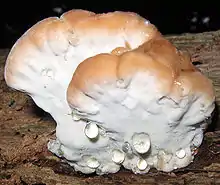Fomitopsis spraguei
Fomitopsis spraguei is a polypore isolated from Washington and Oregon.[1] It can function as a plant pathogen for Quercus species, or as a detritivore for various hardwood logs.[1]
| Fomitopsis spraguei | |
|---|---|
 | |
| Scientific classification | |
| Domain: | Eukaryota |
| Kingdom: | Fungi |
| Division: | Basidiomycota |
| Class: | Agaricomycetes |
| Order: | Polyporales |
| Family: | Fomitopsidaceae |
| Genus: | Fomitopsis |
| Species: | F. spraguei |
| Binomial name | |
| Fomitopsis spraguei (Berk. & M.A. Curtis) Gilb. & Ryvarden, (1985) | |
| Synonyms | |
|
Pilatoporus spraguei (Berk. & M.A. Curtis) Vampola, (1996) | |
Identification
F. spraguei is a perennial fungi. It is sessile, meaning it sticks out from the wood, and sometimes curls up on the edges.[1] It can grow to up to 4 cm thick.[1] The top surface can be ivory white to grey, without any bands or rings.[1] It may have matted "hairs" or be smooth, there is some variation within the species.[1] The bottom of the fungus may be white, buff, or pale brown, and may have a pink tint.[1] The inside of the fungus if broken open is tough and corky, coloured white to grey.[1] There are 3-6 round pores per millimetre.[1]
References
- Ginns, J. H. (James Herbert) (2017). Polypores of British Columbia (Fungi: Basidiomycota). Victoria, BC. ISBN 978-0-7726-7053-3. OCLC 982126526.
{{cite book}}: CS1 maint: location missing publisher (link)